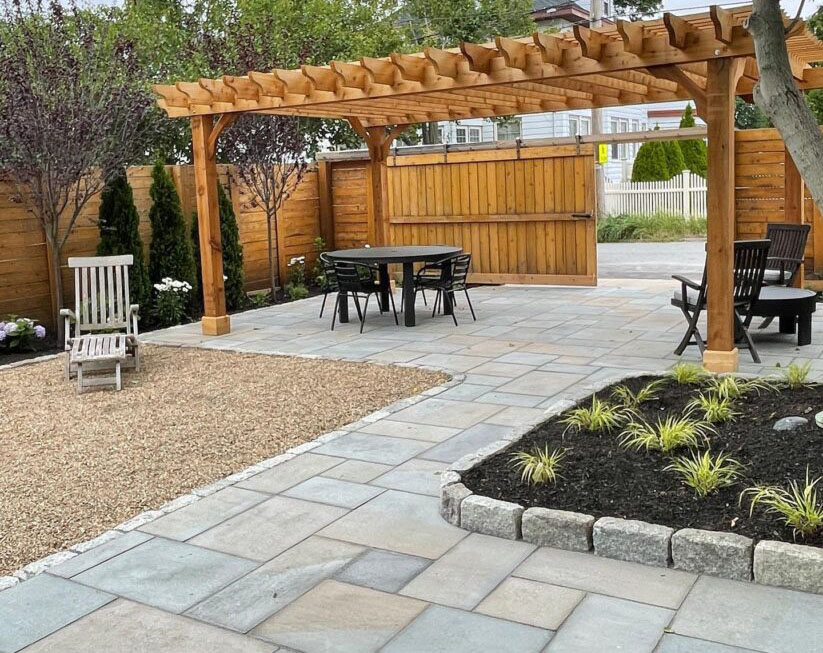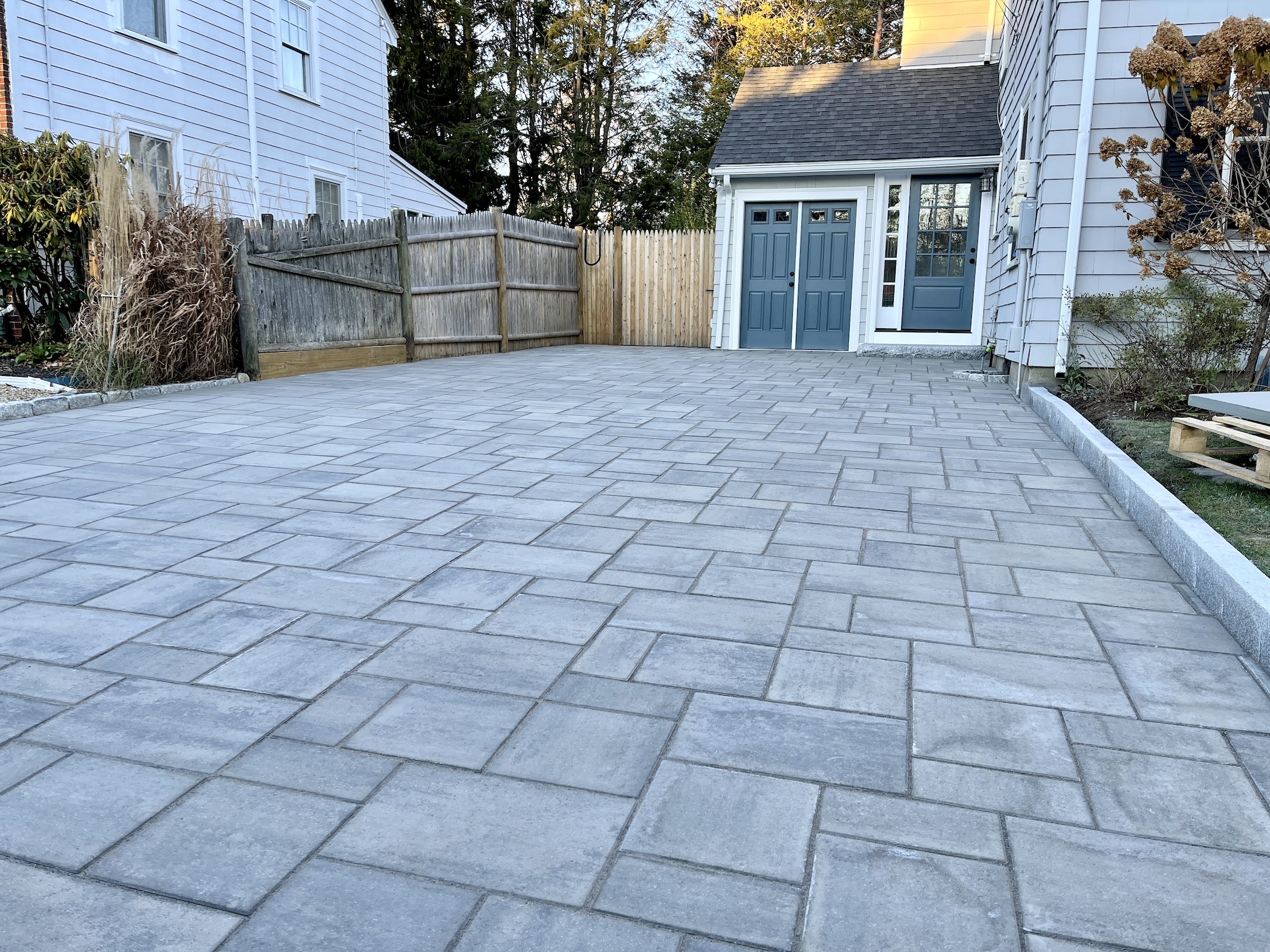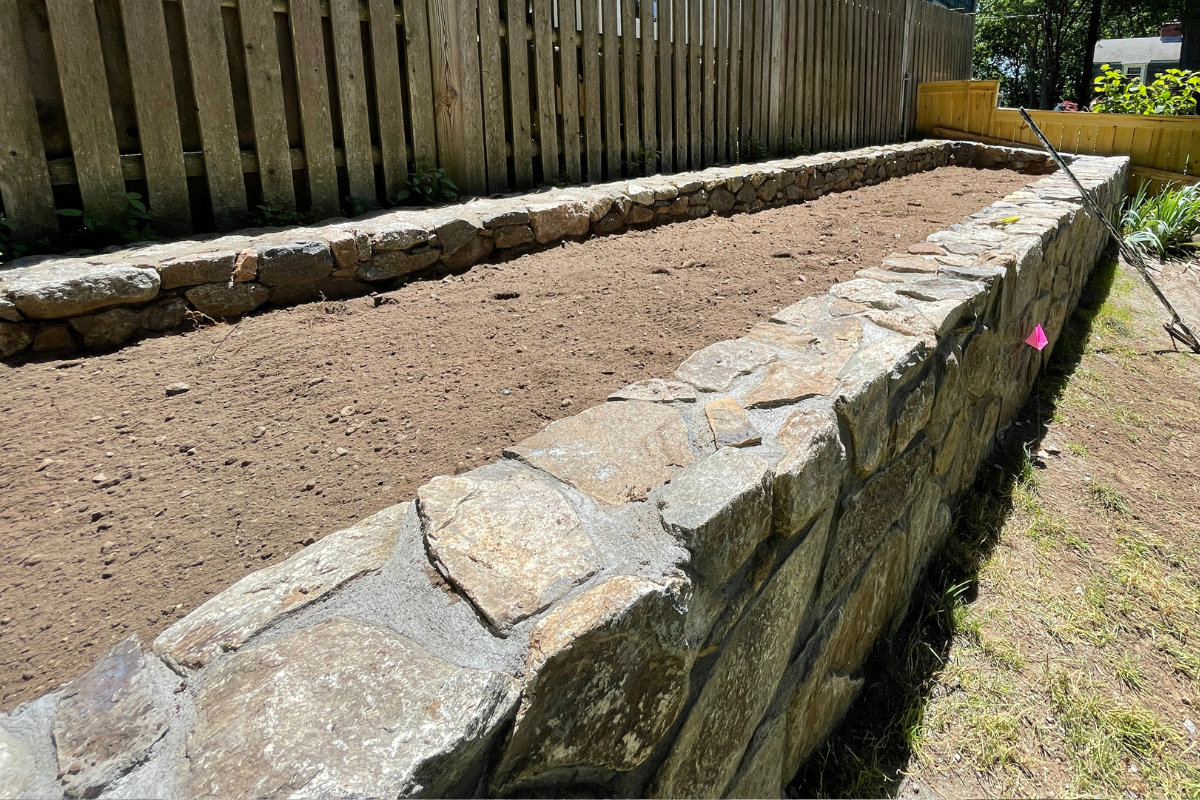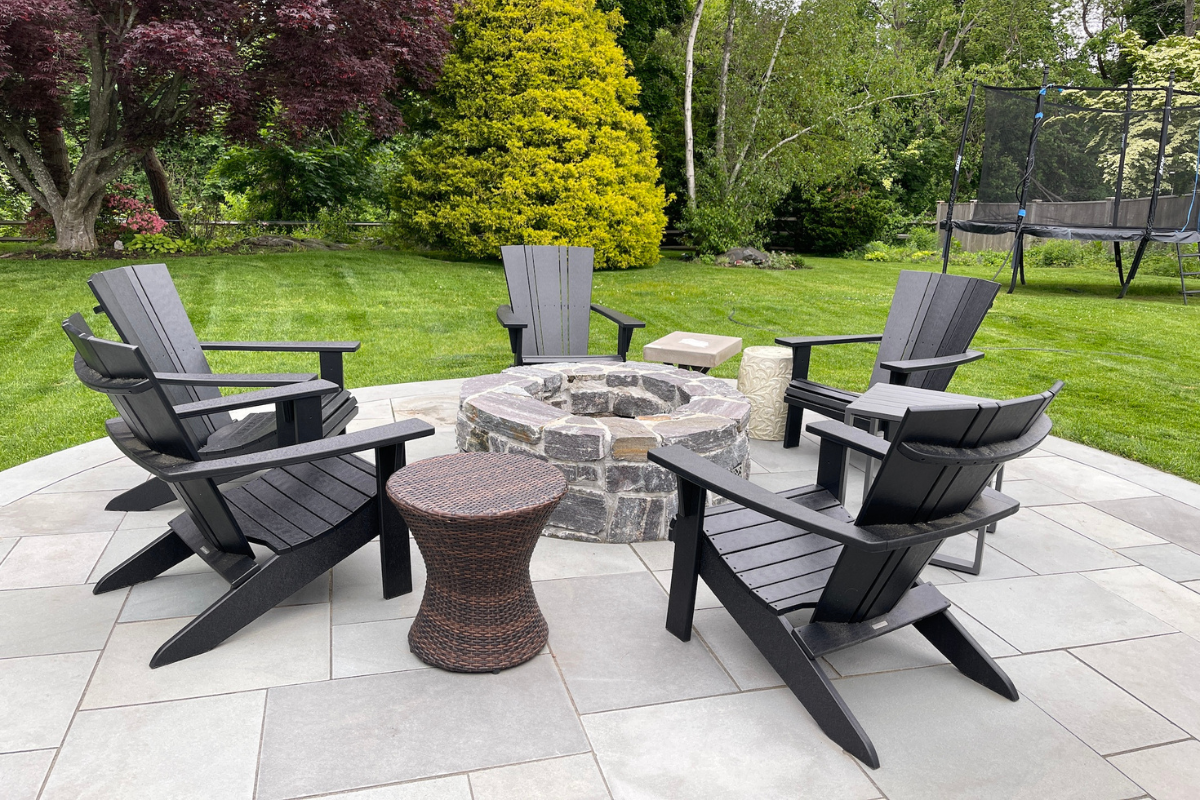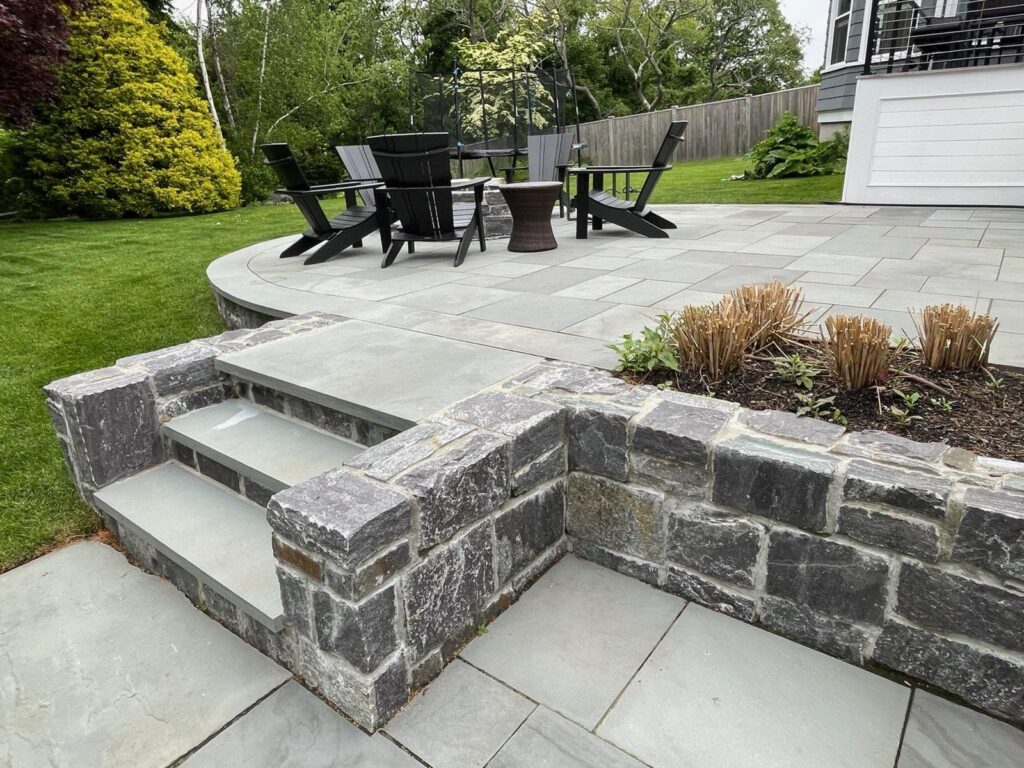
Stone walls bring a timeless appeal to the Northeastern landscape by adding beauty, structure, and functionality to outdoor spaces. Whether used for property boundaries, garden edging, or aesthetic enhancements, stone walls provide durability and natural charm.
Benefits of Stone Walls in Northeastern Landscapes
Stone walls offer several advantages that make them an excellent choice for properties in the Northeast. Their strength, natural appearance, and versatility enhance any outdoor setting.
1. Durability and Longevity
- Stone walls withstand extreme weather, including snow, rain, and freeze-thaw cycles.
- Properly built stone walls last for decades with minimal maintenance.
- Natural resistance to erosion makes stone walls a reliable option for sloped landscapes.
- Unlike wooden fences, stone walls do not rot, warp, or require painting.
- Their ability to absorb and retain heat helps prevent frost damage in winter.
2. Aesthetic Appeal
- Stone walls add a rustic, classic look to gardens, driveways, and patios.
- Various stone types, such as fieldstone, bluestone, and granite, offer diverse textures and colors.
- Dry-stacked or mortared designs allow for custom styles that complement the surrounding landscape.
- Layering different stone shapes and sizes creates a natural, organic appearance.
- Incorporating plantings like creeping thyme or moss softens the look of stone walls over time.
3. Practical Functionality
- Defines property lines while blending naturally with the environment.
- Creates terraced garden beds that enhance visual interest and prevent soil erosion.
- Provides sturdy seating areas, retaining walls, and privacy barriers for outdoor spaces.
- Stone walls can help control water runoff, reducing the impact of heavy rains.
- Their weight and stability make them an excellent windbreak, offering protection for plants and outdoor spaces.
4. Increases Property Value
- Well-designed stone walls enhance curb appeal and attract potential buyers.
- High-quality stonework adds a sense of permanence and craftsmanship to a property.
- Functional retaining walls improve land usability, making properties more desirable.
- Durable stone features require less long-term maintenance, appealing to homeowners.
- Aesthetic enhancements, such as integrated seating or lighting, create unique outdoor living spaces.
Designing Stone Walls for Different Uses
Stone walls serve multiple purposes, from marking boundaries to enhancing garden landscapes. Careful planning ensures they meet both functional and aesthetic needs.
Property Boundaries
Defining property lines with stone walls enhances curb appeal and security.
- Choose taller stone walls for privacy and protection.
- Dry-stacked walls provide a traditional, natural appearance without mortar.
- Combine stone walls with gates or wooden fencing for a custom design.
- For added security, consider using large, heavy stones that deter unauthorized access.
- Curved stone walls create a softer, more inviting boundary than rigid straight lines.
Garden Edging and Raised Beds
Stone walls create striking garden borders and help organize planting areas.
- Use low stone walls to separate flower beds, vegetable gardens, or pathways.
- Retaining walls control soil erosion and improve drainage in sloped gardens.
- Layer different stone sizes for a visually appealing, organic look.
- Integrate steps or seating areas into raised garden beds for additional functionality.
- Consider using stacked stone to create tiered planting areas that maximize space and improve accessibility.
Aesthetic Enhancements
Stone walls add character and depth to outdoor spaces.
- Accent patios, walkways, and water features with decorative stone walls.
- Use stacked stone for fire pits, seating areas, or focal points in a landscape design.
- Integrate lighting along stone walls to enhance ambiance and safety.
- Create small alcoves or recesses within stone walls to showcase sculptures or plants.
- Combine stone walls with pergolas or trellises for a striking visual effect.
Choosing the Right Stone for Your Landscape
Selecting the right stone type ensures durability and enhances the natural surroundings. Consider local materials for an authentic look.
Popular Stone Types
- Fieldstone – Offers a rustic, weathered appearance that blends well with natural settings.
- Bluestone – Provides a smooth, elegant finish perfect for patios and walkways.
- Granite – A durable option with various color choices, ideal for strong retaining walls.
- Limestone – Light-colored stone that works well for decorative elements and seating walls.
- Slate – Dark, flat stone often used for modern landscape designs.
Factors to Consider When Selecting Stone
- Match stone color and texture with existing landscape elements.
- Consider local stone to maintain regional character and reduce costs.
- Choose between rough, natural stone for a rustic look or cut stone for a refined appearance.
- Balance stone size and wall height for both stability and visual appeal.
- Factor in installation costs, as some stones require more labor-intensive placement.
Essential Tips for Building Stone Walls
Proper construction ensures longevity and stability. Follow these guidelines for successful stone wall installation.
Planning and Preparation
- Determine the wall’s purpose and height before selecting materials.
- Mark the layout using stakes and string for accurate placement.
- Excavate a sturdy foundation and compact the base with gravel for stability.
- Ensure proper drainage to prevent water buildup behind retaining walls.
- Factor in natural land slopes to design walls that work with, rather than against, the terrain.
Professional Installation vs. DIY
- Dry-Stacking: A DIY-friendly option, but professional expertise ensures stability over time.
- Mortared Walls: Requires skilled masons for long-lasting structural integrity.
- Interlocking Stones: Precise stone cutting by professionals results in a seamless, polished look.
- Gabion Walls: Large-scale installations often need engineering input for stability.
- Random Rubble Masonry: Experienced masons ensure a secure, visually appealing finish.
Maintenance and Longevity
- Inspect walls regularly for loose stones or signs of erosion.
- Reposition shifted stones to maintain structural integrity.
- Keep vegetation trimmed to prevent root damage to stone walls.
- Clean moss or lichen buildup to preserve the natural beauty of the stones.
- Reapply mortar as needed to reinforce older walls and extend their lifespan.
- Professional inspections can identify structural weaknesses and prevent costly repairs.
- Hiring a mason for annual maintenance ensures longevity and preserves craftsmanship.
- After harsh winters, have an expert assess any shifting or cracking to maintain the wall’s integrity.
- Retaining walls may require professional reinforcement over time to handle pressure from soil and moisture.
Conclusion
Stone walls enhance Northeastern landscapes by offering durability, beauty, and practicality. Whether used for property boundaries, garden edging, or aesthetic appeal, stone walls create lasting value and timeless charm. Investing in high-quality materials, professional installation by a reputable company like Lassana’s Landscaping, and regular maintenance ensures a stone wall that will stand strong for generations.

